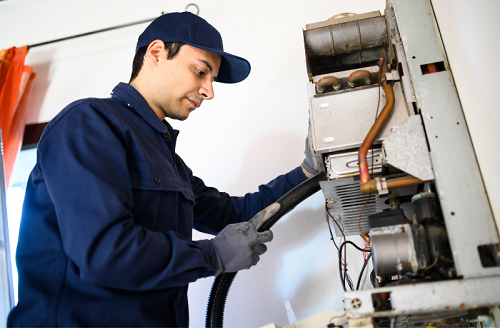When you find a puddle of water around your water heater, a few questions run through your mind, like, “What is the cause of the leak? How bad is the problem? How much will it cost to fix the problem? Can I take a shower if my water heater is leaking?
Water heater leaks are quite common and usually not an emergency. It’s safe to shower, but this will also depend on the cause and extent of the leak. That being said, fixing any leaks as soon as possible is essential to avoid worsening the situation.
Water heaters have become an integral part of the home. They allow users to have hot water for bathing, cooking, cleaning, washing dishes, space heating, and more. Still, they come with the challenge of maintaining and repairing the system. Continue reading to get more information on what to do if your water heater is leaking.
Why Is My Water Heater Leaking When Shower Is On?
Several reasons can cause a water heater to leak, including:
Old Age
Water tanks are built to last about ten years, after which they will start deteriorating. So, sometimes the cause of a leaking water heater is simply aging. In this case, the only thing you can do is replace the water heater.
Cracked Internal Tank
A typical water heater has an external metal wall that you can see and a glass-lined internal tank. If you notice water pooling under the water heater, chances are the internal water tank is damaged.
One reason the internal tank could start leaking is a sediment build-up within the tank. Regularly draining the tank is important; otherwise, a sediment build-up can cause the internal tank to rust and crack. This, together with the high internal water pressure can cause a leak to develop over time.
Cracks in the internal water tank are rarely repairable. Hence, you may need to replace the entire water heater. You can contact a professional plumber to investigate further, and they can also help you find a more efficient replacement.
Loose Connections
Water tanks have inlet and outlet connections that supply water to and from the tank. If any pipes or connections become loose, water will leak from them. Fittings can also crack or get corroded over time, thus leading to water leakage.
Water heaters also have a drain valve at the bottom of the tank, which helps drain the water tank during maintenance. A loose or faulty drain valve will undoubtedly result in a leak. Luckily, a loose valve can be fixed by tightening, but a faulty one must be replaced.
Temperature & Pressure Relief Valve Issues
The T&P valve works to release pressure if there’s too much pressure in the tank or the water gets too hot. If you see water leaking from this part, the valve is doing its job of releasing water when the pressure builds up. Or it could be faulty. The mineral build-up, rust, corrosion, clogged valve, too much pressure, or very high water temperatures can cause the T&P relief valve to malfunction. You can fix this problem by replacing the T&P valve or calling a plumber to deal with the internal pressure problem.
Can I Still Use Water if My Water Heater Is Leaking?
As mentioned earlier, a leaking water heater is rarely considered an emergency. Most leaks start small, meaning you can still take a shower. Plus, you may need to use the water first to be able to diagnose and fix the problem. On the other hand, if the leak is major, it’s best to fix it before continuing to use your water.
As with most appliances, putting a faulty water heater to continual use could cause more significant problems. For instance, larger leaks can cause the water heater to explode. Identifying and fixing the problem promptly is vital to prevent permanent damage to your appliance and property.
Is a Leaking Water Heater Dangerous?
While a leaky water heater is more of an inconvenience, it can lead to severe problems if not handled promptly. Here are the possible risks of continuing to use a leaking water heater:
Property Damage
Water leaking from the heater will end up in your walls, floors, ceiling, and other house parts. This may result in structural damage, paint peeling off, and damage to other appliances and furnishings. The high humidity levels caused by the water leak will also encourage mold and insect infestation. These two issues can be harmful to you and your family members.
Risk of Electrocution
Water is a good conductor of electricity. Therefore, if the leaking water comes into contact with a live electrical wire or power source, it can cause an electric shock to anyone who comes near the wet areas.
Cracks Get Bigger
The pressure inside the water tank will only make the current leakage bigger, thus creating more problems.
Fittings Become Looser and More Damaged
If there’s a leak at the fittings, the constant pressure from the flowing water will loosen the fittings. Remember that the fittings connect the main water supply to the water heater tank. Thus, loose fittings will worsen the leak. Furthermore, if water constantly runs over the metal fittings, it will speed up corrosion.
Scalding Risk
Leaks in water heaters can occur due to broken components. And if the temperature valve has malfunctioned, it can cause water to overheat, thus leading to a scalding risk.
Gas Leak/Fire Hazard
In a gas water heater, the leaking may compromise the gas system, thus enabling the gas to escape. And gas leaks create fire hazards. Usually, you can recognize a gas leak by smell, in which case you should turn off the heater and the gas supply.
Flooding Risk
When showering with a leaky water heater, the large volume of water that goes through a water heater and the high pressure can turn a minor leak into a massive one. And this, in turn, increases the risk of flooding.
Will a Leaking Water Heater Explode?
Sometimes a leaking water heater is due to a faulty T&P valve, which is meant to regulate temperature and pressure. If this valve fails, a pressure build-up in the water tank could lead to an explosion. If this happens, all the hot water in the heater will spill out into the house, causing significant injuries to anyone in the house and severe property damage.
What Do You Do if Water Heater Is Leaking?
Once you notice a puddle of water around your water heater, here are the steps you need to take to start fixing the problem.
Check Where the Leak Is Coming From
There are several reasons why there could be water around your water heater. For starters, a warm water heater during winter can cause condensation, which can soak the ground around the heater.
The puddle of water could also be from nearby appliances like the washing machine or AC. Or, it could be from different plumbing configurations. Start by drying the area to see where the leak is coming from.
Shut off the Water Supply
Once you’ve confirmed that it’s your water heater leaking, turn off the water supply. There’s no use letting water flow into the heater when it only gets wasted through leakage. You can find the cold water inlet pipe at the top of the tank and shut off the valve. If this valve is not working or you cannot locate it, you can turn the main water shut-off valve to stop the water flow to the entire house.
Turn off the Power
Turning off the power before attempting repairs or maintenance on any appliance is important. This is to reduce the risk of electrocution or burns. Find the correct breaker for the electric water heater and turn it off. The gas water heater should have a dedicated shut-off valve near the gas line leading to the tank.
Drain the Water Tank
This step may be necessary, of course, depending on where the leak is coming from. Still, it offers more room for fixing the leak. Draining a water heater tank is also part of its regular maintenance. Be sure to use the right equipment and exercise care during draining, as the system may contain hot water that can cause scalding if mishandled.
Schedule a Repair
Can you fix a leaking water heater? Depending on the extent and location of the leak, you may choose to do the repairs yourself or contact a professional plumber. The latter is best since professionals can do deeper checks and uncover any issues you may not know. And given the risks of a leaking water heater, calling a professional will ensure the repairs are done well to prevent future accidents or damage.
Final Thoughts on Can I Take a Shower if My Water Heater Is Leaking
A leaking water heater doesn’t necessarily mean you must stop your daily use of hot water. Yes, you can take a shower even if your water heater is leaking. But as we’ve seen above, it depends on the leak’s extent. You can carry on with showering that day but ensure you fix the leak or arrange for a professional to solve the issue immediately. It’s also important to call your plumber to inspect and maintain your water heater regularly. And be sure to observe any water heater leaking signs in the future.


